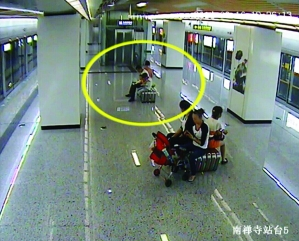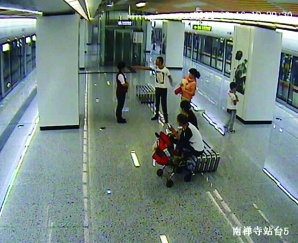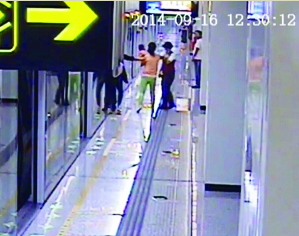Shenzhen Isn’t Lining Up to Become a World Class City
Posted: 11/22/2014 4:55 pmThose who commute using the Shenzhen Metro have heard them so often that they could probably recite them all from memory: the succinct requests for orderliness. “Disembarking precedes embarking” and “please hold the handrail and stand on the right when using the escalator.” But how often do people actually follow these rules?
On a recent Friday afternoon between one and two o’clock (observations were purposely made during non-peak hours) at Grand Theatre station in Luohu District, approximately 80 percent of passengers boarding trains did not wait for disembarking passengers, instead surging ahead at the same time as passengers tried to exit the train. People bumped into each other, pushed and shoved and did whatever it took – but with people moving in both directions in a small space at the same time, it seems like there was no way to proceed that didn’t involve these types of behavior.
“People don’t want to wait for others. They just want to worry about themselves,” Lin said. “When the train comes they just go. They do not think about the message telling them to wait.”
This is common in Shenzhen and in many other parts of China, and not just on the metro. On buses, elevators, escalators and more, people often push and shove, board before people can exit, and generally cause a ruckus despite having ample time to proceed in an orderly fashion.
On that same Friday afternoon at around four o’clock at Happiness Mansion apartment complex in Luohu District, eight out of ten times an elevator arrived at the ground floor, people tried to enter before people had exited. Some who were having a hard time exiting the elevator even recited part of that familiar phrase from the Metro system: ‘前下’ or ‘disembarking comes first’.
On escalators the rule is observed somewhat more closely. On a Thursday afternoon at Jingtian station between noon and one o’clock, approximately 20 percent of people stood on the left even when there was ample space on the right.
When asked about this phenomenon, a station staff member surnamed Sun said people don’t pay attention to the rules during rush hour. He also said operators adjust the amount of time the doors stay open to accommodate for the amount of passengers using the train at any given time. “When there are more people trying to board the train, the doors stay open for longer,” Tan said.
In other words, there is no need to rush into the train because passengers are not in danger of being trapped in the door or left behind as long as they are in line by the time the train arrives and follow the proper procedures.
It is more difficult, however, for station managers to know whether a person inside a train who wants to get off is unable to reach the exit due to people entering first – hence the rule.
‘Let ‘em out!’
Some might assume this is just the way things work in large cities. However, according to people surveyed in New York City, London and Sydney, these rules are followed, and even enforced by the commuters themselves.
Lauren Kraft, an American who has been in Sydney for almost one year, said “almost everyone is awesome” at standing to the right on escalators and letting people moving quickly pass.
Maya Rudolph, who lives in Beijing but lived in New York City for six years, said people usually follow the rule ‘disembarking precedes embarking’, with people often heard yelling the catchphrase “Let ‘em out” when people don’t follow the rules. And although the NYC subway system doesn’t have a lot of escalators, “it’s generally understood that the right side is for standing and left is for passing,” she said.
Charlotte Linton, a longtime Shenzhen expatriate who lived in London for four years and grew up on its outskirts, said people follow the disembarking precedes embarking rule “pretty much always.” As far as the escalator rule, people “always” follow it because “many people in London are in a hurry and they will not take kindly to people blocking the left side of the escalators and slowing them down.” She could not recall a single situation in which people were trying to exit and enter a train simultaneously.
Shenzhen isn’t alone in regards to lack of respect for Metro etiquette; Moscow reportedly has some issues as well. People generally stand on the right and walk on the left of escalators, according to Kristina Bison, an American who lived in Moscow for several years. However, she said things can be a bit of a “free for all” when the doors open to the Metro there during rush hour.
During rush hour, “after a while you kind of forget all the manners and etiquette we were all taught as kids and you…push and shove until you get what you want,” she said. “If you don’t push and shove your way out when that happens, you will never be able to get off the train.”
With Metro workers lacking the authority to punish people for breaking the rules, the problem has become endemic.
“Sometimes people don’t listen to me. All we can do is advise them. We cannot stop them with force. People shouldn’t be in a rush to enter the subway. They should line up. A minority of people are not aware of this rule,” said Huang Zili, team leader of security guards at Grand Theatre Station.
As Shenzhen pushes to become an international city, its leaders might want to consider trying to enforce the small things that make for a more pleasant experience in the city.


















